
Naming every expedition participant in a telepresence-enabled mission is next to impossible! Many from dozens of institutions across the country have provided input into the expedition plan and are expected to participate. However, we've assembled information about the members of the science and remotely operated vehicle teams who are physically onboard NOAA Ship Okeanos Explorer, and whose voices you are likely to hear most often when watching the live video.
And of course, none of this exploration would be possible without the work of the dedicated NOAA Commissioned Officer Corps and civilians who operate NOAA Ship Okeanos Explorer as part of NOAA's fleet managed by NOAA's Office of Marine and Aviation.
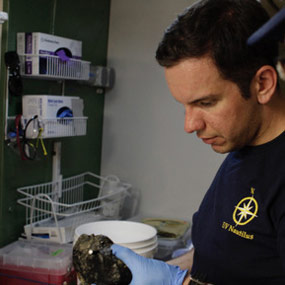
Co-science Lead
Department of Biology at Temple University
Steve is a PhD candidate in the Department of Biology at Temple University. He is broadly interested in the ecology of deep-sea corals. His dissertation research focuses on how deep-sea water masses and abiotic factors influence coral diversity and distribution across depth, particularly on isolated seamounts. Steve has participated as a scientist at sea as well as ashore on several expeditions aboard the E/V Nautilus and Okeanos Explorer in the Gulf of Mexico, Caribbean Sea, and central Pacific Ocean.
Steve received his B.S. in Marine Sciences at the University of Connecticut at Avery Point. He then went on to receive an M.S. in Marine Biology at the University of Maine, Darling Marine Center, where he studied biogeographic patterns on seamount communities in the Drake Passage and Southern Ocean. He is currently in the Cordes Lab at Temple University studying deep-water corals in the Caribbean Sea and equatorial Pacific Ocean.
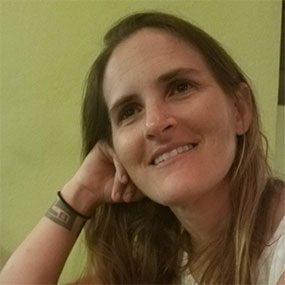
Co-science Lead
Institute for Socio-Ecological Research and Coastal Survey Solutions, LLC
Dr. Stacey Williams holds a Ph.D. in Biological Oceanography from the University of Puerto Rico, Mayaguez, where she studied the population dynamics of a keystone herbivore, the long-spined sea urchin, Diadema antillarum. She is a co-founder of a non-profit organization, Institute for Socio-Ecological Research, and an environmental consulting company, Coastal Survey Solutions, LLC. As a benthic ecologist, her research has been mainly based on assessing the health status of shallow-water reefs throughout the Caribbean. However, in the past 10 years, she has characterized the benthic communities of many mesophotic reefs around Puerto Rico and the U.S. Virgin Islands. In 2015 and 2017, she was part of a team to quantitatively describe the deepwater habitats at important fishing grounds for queen and silk snappers off the west coast of Puerto Rico. Her research interests have focused on examining and understanding the interactions and multiple drivers affecting sessile-benthic and fish communities at shallow to deepwater habitats.
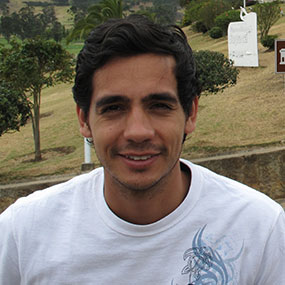
Global Foundation for Ocean Exploration
Fernando graduated from the University of Hawaii at Manoa with a B.S. in Mechanical Engineering. During his studies, he had experience in several fields including conceptual design, aerospace research, mechanical design, robotics, and software development. From these activities he was able to intern for NASA at the Jet Propulsion Laborator, present research in a national conference, and even co-author a technical paper in the Journal of the Astronautical Sciences. His most recent position was at the Field Robotics Laboratory (FRL) where he helped support operations, testing, and software development for two unmanned surface vehicles. From his time in FRL, he discovered a true passion for development and design of robotic systems. Originally from Colombia, Fernando enjoys outdoor activities and currently resides in State College, Pennsylvania.
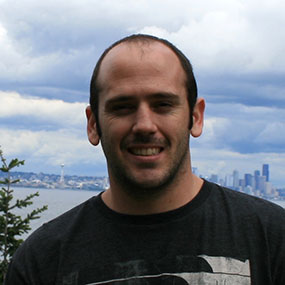
Engineer
Global Foundation for Ocean Exploration
Tony Arnold currently splits his time between working for the Navy at the Naval Undersea Warfare Center (NUWC) in Keyport, Washington, and assisting the Global Foundation for Ocean Exploration with ROV operations. He holds a B.S. and a M.S. in Mechanical Engineering from the University of Hawaii, focused on autonomous robotics in the Field Robotics Lab. Tony started his career as a Mechanical Engineer in the Unmanned Underwater Vehicle group at NUWC, Keyport, and is currently working as an Electrical Engineer in the Rapid Prototyping and Fabrication Technology Division. Tony brings with him a wide range of skills and experience in mechanical engineering, electrical engineering, and software design.
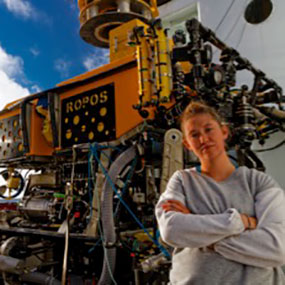
Hydrographer and Marine Geologist
Neah Baechler is a contract Hydrographer and Marine Geologist dedicated to exploring the depths of our planet’s most elusive ecosystem: the ocean. She began her career at the College of Charleston in South Carolina as a Benthic Acoustic Mapping and Sonar (BEAMS) program student, honing her skills in seafloor mapping. Through the BEAMS program, Neah had the opportunity to sail on multiple research expeditions with NOAA, the University of Washington, and with hydrographic firms in the private sector. These experiences jump started her love for ocean research and time spent at sea. Since earning her Bachelor of Science in 2015, Neah has dedicated herself to exploration and discovery, traveling and mapping the seafloor in far reaching locations. Her passion for research expeditions has only grown, and she plans to further her sub-surface study in a graduate program focused around temperature-driven ocean circulation and its effects on climate. Neah hopes to spread her enthusiasm for all things marine through outreach and documentary filmmaking, educating people about the widespread impacts our ocean has on our daily life.
Outside of hydrography, time well spent for Neah is hiking, camping or reading in a quiet corner of her Portland, Oregon home.
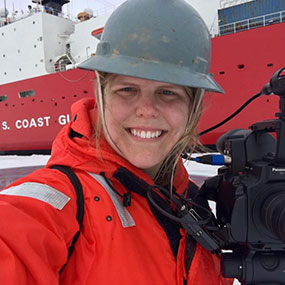
Video Producer
Global Foundation for Ocean Exploration
Caitlin Bailey holds an MFA in Science and Natural History Filmmaking from Montana State University and a B.S. in Animal Biology from Texas A&M University-Corpus Christi. Her background includes fieldwork with sea otters in Alaska, lab research on wild mice vocalizations, research on migratory bird distribution on the Texas coast, and mentoring undergraduate students in biology. She also volunteered with the Texas Marine Mammal Stranding Network and the Second Chances Wildlife Rehabilitation program at the Texas State Aquarium. In pursuit of her filmmaking career, Caitlin held a writing and film internship at NASA Goddard Space Flight Center and worked as a camera operator and stage manager with Montana PBS. Before her current position with the Global Foundation for Ocean Exploration, she discovered the amazing world of ocean exploration as a video engineering intern onboard the E/V Nautilus.
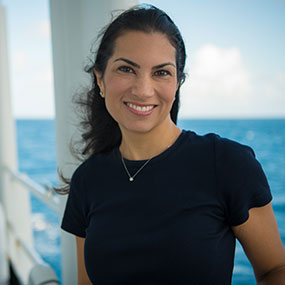
Web Coordinator
NOAA Office of Ocean Exploration and Research
Debi Blaney is an ocean explorer, scientist, and education specialist. A native of Germany, she started her education in Dortmund and Münster, Germany. She holds a B.S. in Biology from the University of Iowa and a M.S. in Neuroscience from Georgetown University. Debi has extensive experience in neuro-scientific research, as well as science education and outreach in the fields of space and ocean exploration. Since early 2016, Debi has worked as a Senior Education Specialist at NOAA’s Office of Ocean Exploration and Research to help improve ocean literacy and inspire future generations of explorers and scientists. During at-sea expeditions she acts as Web Coordinator documenting the mission.
Debi lives in the Washington, DC, area, and when she is not working, she enjoys traveling and being outdoors, especially scuba diving and rock climbing.
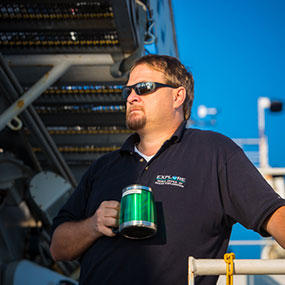
Electronic Systems Engineer
Global Foundation for Ocean Exploration
Roland Brian brings 29 years of experience and a keen eye for precision HD video to the program as a video/satellite and telepresence engineer. Roland began his career in the U.S. Air Force where he worked as a Satellite Communications Engineering Technician with visions of working on the U.S. Space Station. He traded in that quest for one of deep-ocean exploration and sharing beautiful imagery with the world. He has worked with the NOAA Office of Ocean Exploration and Research (OER) and the Okeanos Explorer since 2009 and has been engaged in every telepresence-enabled remotely operated vehicle (ROV) expedition. He has also provided services for other projects using OER’s mobile telepresence system, including the 2012 Ring of Fire Expedition. His duties aboard NOAA Ship Okeanos Explorer include operation and maintenance of the ship’s telepresence and video systems, including on ROV Deep Discoverer and the Seirios camera platform. Again, Roland’s experience embodies the breadth and depth of knowledge the OER program encourages. When not fine-tuning the video and telepresence systems or training and mentoring new team members, he’s actively involved in the editing process of our ever-expanding ocean exploration video library. While not at sea, Roland enjoys life with his wife and family in sunny Sarasota, Florida.
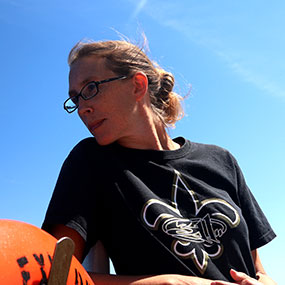
Research Program Manager
NCEI/Center for Coasts, Oceans and Geophysics/Information Services Division/Northern Gulf Institute
Megan Cromwell is a Research Program Manager for NOAA’s National Centers for Environmental Information (NCEI) through the Northern Gulf Institute. She serves as the NCEI team lead for the Okeanos Explorer end-to-end data management activities. Megan has been with the NOAA Office of Ocean Exploration and Research Data Management Team since her start as a student intern. She completed her Bachelor of Science in Oceanography with a minor in Geographical Information Systems from the University of Southern Mississippi and is currently working towards a Master’s degree in Environmental Geoscience. Megan has been a competitive sailor since her childhood which initiated her love for the ocean.
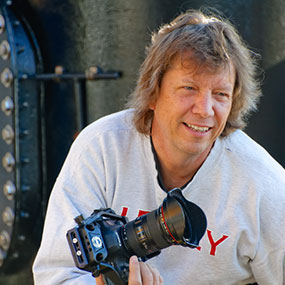
Photographer and Producer
Global Foundation for Ocean Exploration
For 34 years, Emmy-award winning photographer and producer Art Howard has helped viewers experience life through images from 50 countries and seven continents. A native North Carolinian, Art has followed researchers aboard multiple deep-sea missions, documenting the excitement and challenges of offshore reef exploration. Art will use the latest video technology to bring viewers as close as possible to life at sea from the surface to depths of 3,000 feet, capturing both the scientists and the life they seek to understand. Howard has spent the last 11 years independently producing media for the North Carolina Museum of Natural Sciences.
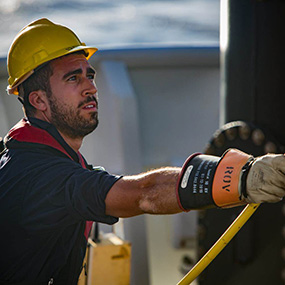
Electrical Engineer
Global Foundation for Ocean Exploration
Sean Kennison holds a B.S. in Mechanical Engineering with a minor in Engineering Mechanics from Pennsylvania State University. He first sailed on the Okeanos Explorer as an intern and member of the Engineering Group, where he performed tasks associated with the launch, operation, and recovery of the ROV system. He has also worked shoreside, designing mechanical parts for the ROVs and assisting with assembly and testing of previously and newly installed equipment. Sean also assisted with installing electronics, testing, data analysis, and troubleshooting on the vehicle. Most recently, he assisted in assembling and modifying a new bio storage box for the Deep Discoverer ROV. While at Penn State, Sean served as team leader on a number of engineering design projects.
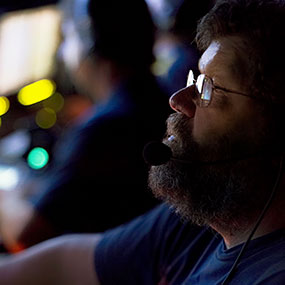
Global Foundation for Ocean Exploration
Bob has almost 50 years’ experience in broadcast engineering. Following a 37-year career with RIPBS, departing in 2006 as Chief Engineer, he worked for the Sea Research Foundation and Ocean Exploration Trust as the Senior Broadcast Engineer. He was responsible for the design, commissioning, and maintenance of the Inner Space Center located at the University of Rhode Island Graduate School of Oceanography. He also worked on many research vessels and supported telepresence operations from NOAA Ship Okeanos Explorer, E/V Nautilus, R/V Endeavor, and R/V Atlantis, plus many other UNOLS ships. Bob is married and has six adult children, nine grandchildren, and a great-grandson. He and his wife Donna play French horn and are active in many community music ensembles in Rhode Island.
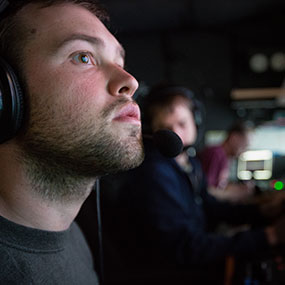
Electrical Engineer
Global Foundation for Ocean Exploration
Jeff Laning holds a B.S. in Electrical Engineering from the University of Vermont. He started his career as an intern with Greensea Systems, Inc., where he worked on design, development, and integration of components and software associated with remotely operated vehicles and autonomous underwater vehicle systems.
Jeff is one of our youngest members and came to our group with a desire to learn new and complex electrical systems. Electrical engineers interested in and capable of working on deep submergence systems are one of the hardest positions to fill. Jeff has done a great job as a key member of the team that built Deep Discoverer and has become a skilled pilot, co-pilot, and navigator. His contribution to ocean exploration is certainly something to be proud of and we hope that other young engineers will be inspired by what he has accomplished. Jeff currently resides in Vermont.

Mechanical Engineer
Global Foundation for Ocean Exploration
Andy Lister graduated from Texas A&M with a degree in Ocean Engineering. He went on to study at Embry-Riddle, focusing on artificial intelligence systems and obtaining a Master’s in Mechanical Engineering. After school he worked in the oilfield before starting his own business in 2014. He has currently joined the team as a mechanical engineer with additional interests in the data management side. He enjoys coding, electronics, and working onboard the Okeanos Explorer to bring the public to unexplored places across the globe.
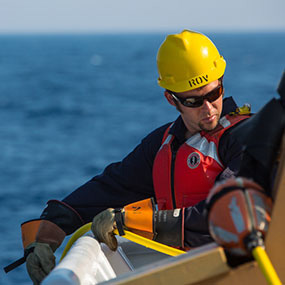
Ocean/Mechanical Engineer
Global Foundation for Ocean Exploration
Karl McLetchie is a graduate of the Massachusetts Institute of Technology. He holds B.S. and M.S. degrees in Ocean and Mechanical Engineering. After graduating, he worked as an ocean engineer on the development of autonomous underwater vehicles and as a naval architect on the design of high-speed aluminum vessels. In 2008, he started his own contracting company, SeaKnowledge, to support the use of underwater vehicles for research and exploration. He has worked as a remotely operated vehicle pilot and navigator on the Okeanos Explorer and the E/V Nautilus ever since. When not on assignment for Ocean Exploration, Karl resides in Pemaquid, Maine.
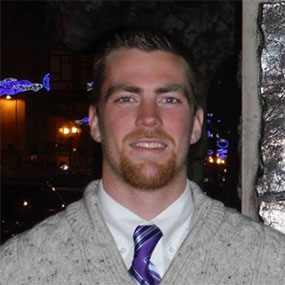
Ocean/Mechanical Engineer
Global Foundation for Ocean Exploration
Lars holds a B.S. in Ocean Engineering and a B.A. in Spanish from the University of Rhode Island. Growing up on the coast of Maine he developed a constant pull towards the unknown, the unexplored, and chaotic environments and acquired a drive to bring meaning, understanding, and order to these areas. Lars has a professional background working with autonomous underwater vehicles and other subsea robotics systems both internationally and nationally and now supports the Deep Discoverer and Seirios as an ocean/mechanical engineer.
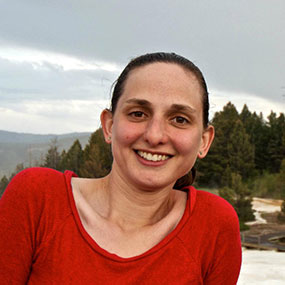
Video Producer
Global Foundation for Ocean Exploration
Emily Narrow is a video producer and editor whose work focuses on science and nature. She earned a Bachelor of Arts degree from Oberlin College where she double-majored in Biology and Cinema Studies. She also holds an MFA degree in Science and Natural History Filmmaking from Montana State University. She was a video producer for a production company in Washington, DC, for three years, where she made public service announcements, ad campaigns, and promotional videos for non-profit and environmental organizations. For the past six years, she has been a freelance video producer, creating videos for clients such as the National Park Service, NOAA, and Montana State University. Most recently, she produced and edited a series of educational videos about camping and hunting for Zero Point Zero Productions. Emily currently resides in Bozeman, Montana.
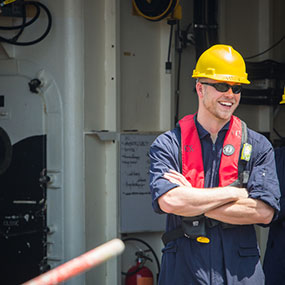
Ocean Engineer
Chris first joined our group on the Cayman Rise Expedition in 2011, just prior to being hired full time by NAVSEA. For the next three years, an informal NAVSEA-NOAA relationship allowed Chris to continue to participate in our design, engineering, and offshore operations. Chris holds a B.S. in Ocean Engineering and a B.S. in Aerospace Engineering from Virginia Tech with a minor in mathematics. Chris has been a major contributor to our design-build process and a tremendous asset to our offshore operations. He is a skilled navigator, pilot, and co-pilot of our vehicles and brings with him a level of enthusiasm that everyone around him appreciates and respects. In late 2014, Chris joined our Mechanical Engineering team full time and he is enthusiastic about training the next generation and tackling new projects. Chris resides in Falls Church, Virginia.
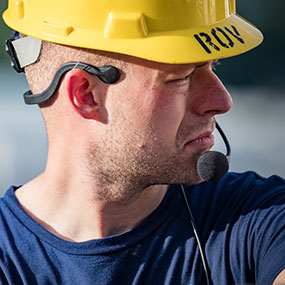
ROV Engineer
Global Foundation for Ocean Exploration
Daniel Rogers brings with him a diverse background in engineering, media production, and education. Daniel holds a B.S. in physics and received an M.S. in mechanical engineering from the University of Hawaii in 2013. His graduate work focused on the development and evaluation of an autonomous marine vessel designed for port and harbor security missions. Before starting his graduate program, Daniel worked as a science educator at the Bishop Museum in Honolulu where he continued as a digital media producer while in school. A lifelong interest in the sciences inspires him to learn all he can about the natural world and he is passionate about sharing the drama and wonder of scientific inquiry with others.
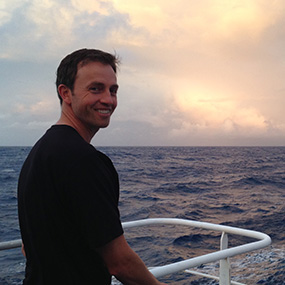
Mapping Lead
NOAA Office of Ocean Exploration and Research
Derek Sowers holds a B.S. in Environmental Science from the University of New Hampshire and an M.S. in Marine Resource Management from Oregon State University. He has 14 years of previous coastal research and management experience, including work for NOAA's National Estuarine Research Reserve network and the Environmental Protection Agency's National Estuary Program in both Oregon and New Hampshire. Derek has participated in ocean research expeditions in the Arctic Ocean, Gulf of Maine, Gulf of Mexico, Pacific Northwest continental shelf, North Atlantic Canyons, and New England Seamounts.
During at-sea expeditions, Derek leads sonar data collection by planning the ship's mapping routes and producing maps of seafloor and water column features to guide exploration. On shore, Derek works at the Center for Coastal and Ocean Mapping/Joint Hydrographic Center at the University of New Hampshire to coordinate future mapping expeditions, process and archive data, and collaborate with other scientists. Derek is also a part-time Oceanography Ph.D. student focused on using Extended Continental Shelf and Okeanos Explorer data to develop marine ecological classification maps.
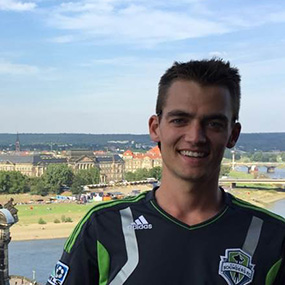
ROV Engineer
Global Foundation for Ocean Exploration
Levi Unema is an Eagle Scout from Lynden, Washington. He holds a B.S. in Electrical Engineering along with a Certificate in Electric Power Engineering from Michigan Technological University. Levi has experience in a number of different industries, ranging from the railroad, to steel mills, to automotive supplier light manufacturing. Currently living in west Michigan, he enjoys being outdoors and staying active.
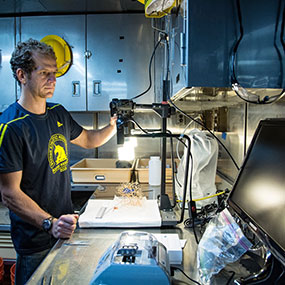
Expedition Coordinator
NOAA Office of Ocean Exploration and Research
Dr. Daniel Wagner works as an expedition coordinator for the NOAA Office of Ocean Exploration and Research. Daniel has conducted fieldwork on deep-sea ecosystems since 2006 and has since spent over 500 days at sea during 25 multi-disciplinary research expeditions that explored deep-sea habitats throughout the Indo-Pacific, Atlantic, and Southern Oceans. Daniel grew up in Ecuador, where at a young age he interned at the Galapagos National Park, an experience during which he developed a deep fascination for nature and the oceans. Daniel then moved to Hawaii, where he earned a Bachelor of Science in Biology from Hawaii Pacific University, as well as a Master of Science and Ph.D. degrees in Oceanography from the University of Hawaii at Mānoa. Daniel resides in Charleston, South Carolina.